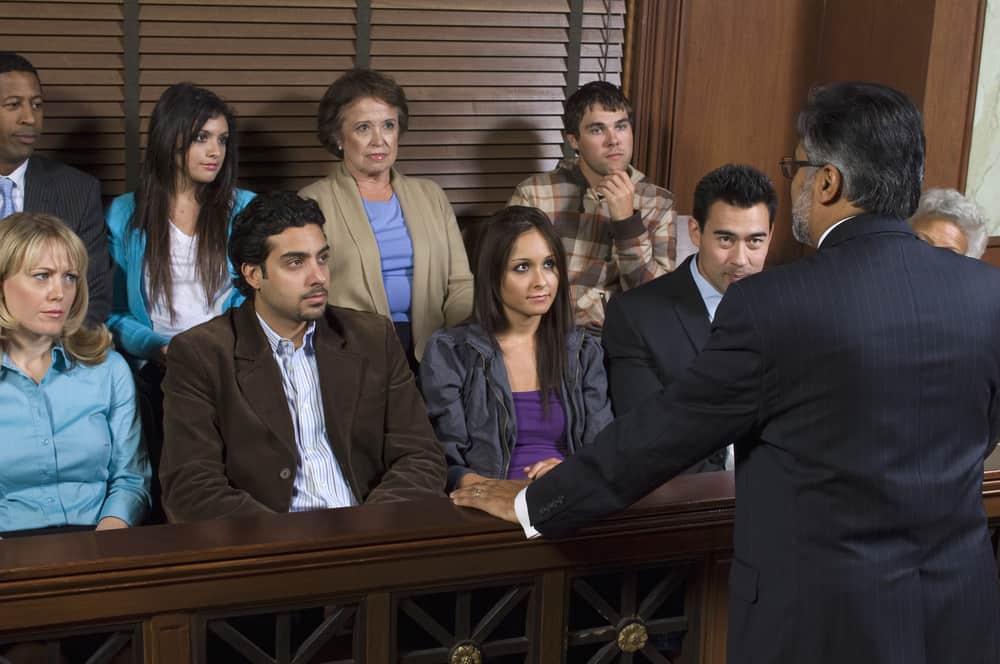- While bench warrants are less likely for a first-time offender ignoring a summons to jury duty, they become more likely if (a) you are a habitual offender in terms of neglecting summons and/or (b) miss actual duty after being seated on a jury without an excused leave of absence or a plausible reason for the same.
Whatever the situation, neither a Show Cause Notice nor a Bench Warrant being issued are benign situations. In the Bench Warrant case, you will be held in Contempt of Court and ordered to pay a fine – which varies depending on the state, as we will see below. The Show Cause Notice may end up in the same situation if the Judge is unsatisfied with your explanations.
The bottom line is that ignoring a summons to jury duty is not a good idea – you should be aware of the consequences. At the very least, call the courthouse (if you feel you have a legitimate reason) and try to get out of the commitment in an above-board fashion.
Range of Punishments, Penalties, and Fines Vary by State
We mentioned before that the range of actions available to a Judge varies a lot by state. Let’s review two states, side by side, to get a feel for what could happen.
Table 1 below compares Illinois (a relatively lenient state) with Texas (a somewhat harsher state) for ignoring the summons from a County or District court:
Table 1: Penalties for Ignoring Jury Duty Summons and/or Failing to Appear
| Type of Penalty | Illinois | Texas |
| Fine | $5-$100 | $100-$1000 |
| Jail Time | Yes, based on the discretion of the Judge. | Up to 6 months. |
| Community Service | Possible, either instead of or in addition to, jail time. | Possible, either instead of. or in addition to jail time. |
| Charge | Contempt of Court | Contempt of Court |
It is to be noted that the types of punishments are usually lesser for incidents involving a municipal or small claims court. There, if you are found in contempt, you will be penalized per standard Federal guidelines, with a fine of up to $100 and up to three nights in jail.
The Final Word
There are usually ways of getting excused from jury duty with some communication with the Clerk of the Court, especially if you have a plausible excuse.
Ignoring the summons to jury duty with no communication and no good reason is rarely a good idea, on the other hand. If you find yourself faced with a Show Cause Notice or a Bench Warrant issued, be very careful how you proceed.
Consulting with a criminal defense attorney and having counsel appear on your behalf may often be your best recourse if you find yourself in an unfortunate situation with the court.

What happens if you don’t answer a jury summons?
As mentioned above, the situation varies by state and the discretion of the Judge who has issued the summons to decide how to deal with a no-show. The judge may ignore it and send you a notice to appear in court to explain your absence or the judge may have you arrested and brought to the courtroom.
If You do Get Called, Will you Automatically Serve on the Jury?
Not even close. When people appear in a jury pool, there are multiple steps in the selection process where someone can be excused from appearing on the Jury
How Often Can Someone be Called for Jury Duty?
State laws also govern the frequency of calls to jury duty. Some states, for example, will not allow people to be summoned for jury duty more than once every 12 months.
Can you get in trouble for being late to jury duty?
This is similar to missing jury duty so try to call ahead if you can. Lateness can be considered absence, it depends on the state and the judge
What is the oldest age for jury duty?
There is no age exemption for jury duty. Many people are physically and mentally capable of serving on a jury at 90 and others are unable to at 60. If you are unable to serve due to your age, let the court know
Can jurors talk to each other?
Of course they can talk to each other but they should refrain from discussing the case until deliberations officially begin
Can jurors go home?
Typically, jurors go home at night but receive instructions to ensure that there isn’t any inappropriate influence.
How are the 12 jurors chosen?
Lawyers and judges use the “voir dire” (Latin for speak the truth) process to choose twelve jurors. Judge and lawyers for each side question prospective jurors to determine if they are suitable to judge the case fairly.
What ages are eligible for jury duty?
In most states anyone over the age of 18 with no upper limit due to age
How do jurors vote?
After both parties finish presenting all evidence, the jury goes to a secluded room to decide and then vote on a verdict. This verdict is then presented to the court
Do jurors get paid in the US?
State and local rules vary, but federal jurors receive $50 per day, reasonable transportation expenses, and parking fees. Jurors serving overnight receive an allowance for meals and lodging.
Can you get out of jury duty due to anxiety?
If you are summoned, you must appear. When you are questioned by the court, you can explain your condition and they may excuse you especially if they are afraid a panic attack can be disruptive.
What happens if all 12 jurors don’t agree?
If the jury cannot agree on a unanimous verdict in a criminal trial, a hung jury may be declared, and there would be a mistrial. However, the number of jurors who sit on a jury panel and the percentage of jurors required for a verdict vary depending on state laws. The government may try the case again before a new jury or decide not to pursue the case further.
I am over 70, why am I being called for jury service?
There is no maximum age for jury service
How often is there a hung jury?
A hung jury where no verdict is reached on any count is rare and only happens 7.5% of the time. The jury being hung on the top count (the most serious charge against the defendant) occurred 10% of the time.
